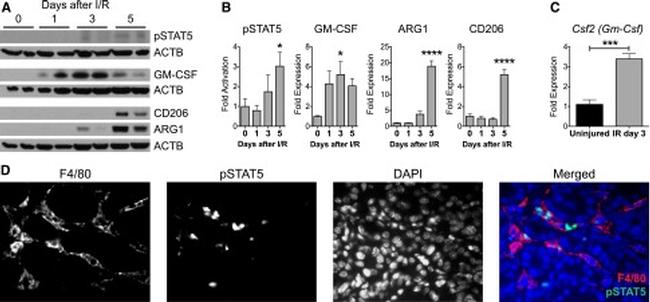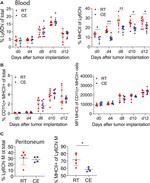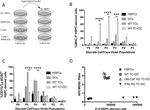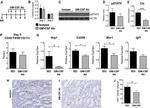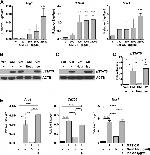Search Thermo Fisher Scientific
Invitrogen
GM-CSF Monoclonal Antibody (MP1-22E9), Functional Grade, eBioscience™
Product Details
16-7331-81
Species Reactivity
Published species
Host/Isotype
Recommended Isotype Control
Class
Type
Clone
Conjugate
Form
Concentration
Purification
Storage buffer
Contains
Storage conditions
Shipping conditions
RRID
Product Specific Information
Description: The MP1-22E9 antibody reacts with mouse granulocyte/macrophage - colony stimulating factor (GM-CSF). The MP1-22E9 antibody is a neutralizing antibody. Mouse GM-CSF is a 14 kDa factor produced mainly by activated T cells and macrophages. Other cell types, such as endothelium and fibroblasts, also secrete GM-CSF in response to TNF-alpha, IL-2, IL-1, and IFN-gamma. GM-CSF stimulates growth of macrophages, granulocytes and dendritic cells. GM-CSF is found as a membrane-bound form and also as a complex associated with the extracellular matrix. Non-glycosylated GM-CSF is biologically active.
Applications Reported: The MP1-22E9 antibody has been reported for use in ELISA, ELISPOT, neutralization, and intracellular staining for flow cytometric analysis.
Applications Tested: The Functional Grade Purified MP1-22E9 antibody has been tested by LAL assay to verify low endotoxin levels, by ELISA, and in bioassay for neutralization of GM-CSF bioactivity.
The MP1-22E9 antibody at 1.25 µg/mL has been found to inhibit by 50% the biological effects of 1 ng/mL mouse GM-CSF in an MC/9 cell proliferation assay. Detailed information and protocols about cytokine bioassays and in vitro cytokine neutralization using antibodies can be found in the BestProtocols® section.
The MP1-22E9 antibody has been tested as the capture antibody in a sandwich ELISA for analysis of mouse GM-CSF (Granulocyte/Macrophage-Colony Stimulating Factor, GMCSF) in combination with the biotin MP1-31G6 (13-7332) antibody for detection and recombinant mouse GM-CSF (14-8331) as the standard. A suitable range of concentrations of this antibody for ELISA capture is 1-4 µg/mL. A standard curve consisting of doubling dilutions of the recombinant standard over the range of 1000 pg/mL - 8 pg/mL should be included in each ELISA plate.
Storage and handling: Use in a sterile environment.
Filtration: 0.2 µm post-manufacturing filtered.
Purity: Greater than 90%, as determined by SDS-PAGE.
Endotoxin Level: Less than 0.001 ng/µg antibody, as determined by LAL assay.
Aggregation: Less than 10%, as determined by HPLC.
Target Information
The GM-CSF gene encodes for a cytokine that regulates the production, differentiation, and function of macrophages and granulocytes. The active form of the protein exists as a homodimer in the extracellular space. This gene is located in a cluster of related genes at the chromosome region 5q31, which has been associated with interstitial deletions in the 5q- syndrome and acute myelogenous leukemia. Other genes in the cluster include interleukins 4, 5, and 13. The gene is involved in promoting tissue inflammation. Elevated levels of cytokines, including the one produced by this gene, have been observed in SARS-CoV-2 infected patients with acute respiratory distress syndrome. Mice that lack this gene or its receptor have been shown to develop pulmonary alveolar proteinosis.
For Research Use Only. Not for use in diagnostic procedures. Not for resale without express authorization.
Bioinformatics
Protein Aliases: Colony-stimulating factor; CSF; GM-CSF; granulocyte macrophage colony stimulating factor; granulocyte-macrophage colony stimulating factor 2; Granulocyte-macrophage colony-stimulating factor; M-GM-CSF; MGC131935; MGC138897; MGC151255; MGC151257; put. GM-CSF
Gene Aliases: Csf2; Csfgm; Gm-CSf; GMCSF; MGI-IGM
UniProt ID: (Mouse) P01587
Entrez Gene ID: (Mouse) 12981

Performance Guarantee
If an Invitrogen™ antibody doesn't perform as described on our website or datasheet,we'll replace the product at no cost to you, or provide you with a credit for a future purchase.*
Learn more
We're here to help
Get expert recommendations for common problems or connect directly with an on staff expert for technical assistance related to applications, equipment and general product use.
Contact tech support
